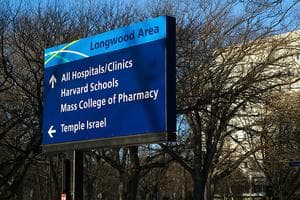Advertisement
Pfizer In Boston Invests $100M To Speed Up Bench-To-Bedside

Both the Globe and the Herald report today on the drug giant Pfizer's launch of a $100-million project with academics in the Longwood Medical Area to turn basic science discoveries into useful medications faster.
The Globe's Carolyn Johnson reports here:
The new Center for Therapeutic Innovation, which will create about 50 jobs, is part of a global Pfizer initiative to foster new kinds of collaboration with academia to accelerate drug development, a program that will be headquartered in Boston.
Bridging the chasm between “eureka’’ moments at the lab bench and the development and use of new drugs at the bedside has become an urgent national priority. In the biomedical research community, this problem is known as “the valley of death’’ — where exciting lab results stall while patients desperately wait for breakthroughs.
The Herald's Brendan Lynch reports here:
“The reality is the government is broke, and there’s a very big hole in funding to universities doing life sciences research, so what replaces that?” said Vinit Nijhawan, managing director of Boston University’s Office of Technology Development.
Enter New York-based Pfizer, the world’s largest drug maker, which announced yesterday that it is leasing lab space in the Longwood Medical Area and making a $100 million investment over five years to establish what it’s calling the Centers for Therapeutic Innovation — a partnership with local hospitals and universities to help develop technologies that hold business promise.
“Not so long ago, it was common for pharmaceutical companies, including Pfizer, to keep our R&D in-house, under lock and key,” said Sally Susman, Pfizer’s executive vice president for policy, external affairs and communications. “That approach can’t meet the demands we face in today’s world.”
The Globe adds another interesting reason for the project: complexity.
“The reality is that at this point, in the history of cancer medicine and medicine in general, it’s exceedingly clear the greatest challenge is the complexity of the biology,’’ said Dr. Ronald DePinho, director of the Belfer Institute. “One needs new academic constructs . . . to systematically translate these brilliant discoveries into clinical endpoints, and that has been challenging to do or inefficiently done.’’
This program aired on June 9, 2011. The audio for this program is not available.
